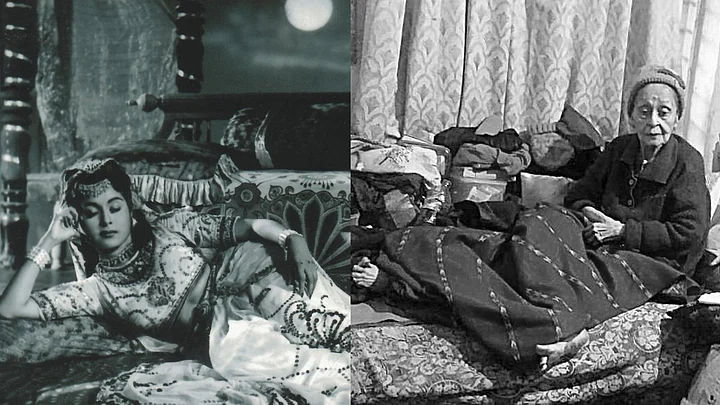At the age of 91, the pixie-like actor of the 1950s – Smriti Biswas – who featured in the films of Guru Dutt, V Shantaram, Bimal Roy, Mrinal Sen, BR Chopra, and Raj Kapoor besides co-starring with Dev Anand, Kishore Kumar and Bhagwan Dada among others – is leading a hand-to-mouth existence in a one-room tenement in Nashik since nearly three years now.
The actor who started off as a child artiste and gamely took on lead and supporting roles, didn’t ever become a household name, even if she did appear as a cover girl on Filmfare magazine. Featuring in approximately 30 films, moreover the Bengal-born Smriti Biswas, retired prematurely on marrying the doctor-turned-film director SD Narang. She quit because on the day of the wedding itself, Narang had asserted, “I need a wife, not an actress.”
That she is virtually penniless today was found by actor Anju Mahendroo. Next, filmmaker and archivist Shivendra Singh Dungarpur tracked the once-feisty actor to a cramped apartment in Goregaon which was beyond her means. This compelled her to relocate in Nashik. She has two sons, Rajeev and Jeetu.
The latter has been trying to raise funds from the Cine and TV Artistes’ Association (CINTAA). But since she had not registered herself as a member, there is an impasse. Amit Behl, spokesperson of CINTAA, however, did assure The Quint that they would inquire into her case and do whatever is humanly possible.
Yesteryear heroine Asha Parekh said that she knew Smriti Biswas personally and would contact her to offer help. Meanwhile, Dungarpur has made a donation towards her caretaking but as he admits, “It is not sufficient to ensure that she leads her life without financial worries.”
Clearly, here’s another instance of a Bollywood heroine whose riches-to-rags story has resonances of the poverty-stricken circumstances under which several film celebrities – notably danseuse Cuckoo, Meena Kumari, Master Nissar, Bharat Bhushan, Bhagwan Dada and the stunt movie queen Chitra – passed away in dire straits, when they no longer received acting offers.
Smriti Biswas is not bitter at all about the film industry, saying, “I enjoyed myself thoroughly while my career lasted.” Retaining her zest for life, she does add ruefully that any form of medical and financial aid is essential to make ends meet currently, especially while the COVID-19 pandemic rages.
Starting off as a child actor at the age of 10 in the Bengali film Sandhya, she went on to act in several more Kolkata-produced features including Hemant Bose’s Dwanda and Mrinal Sen’s Neel Akasher Neechey.
On shifting to Bombay, during the 1950s she enacted pivotal parts in Bimal Roy’s Pehla Aadmi, AR Kardar’s Bhaagam Bhaag opposite Kishore Kumar, Bhagwan Dada’s Baap Re Baap, AN Bannerjee’s Humsafar with Dev Anand, Guru Dutt’s Sailaab with Geeta Bali, V Shantaram’s Teen Batti Aur Chaar Raasta, the Raj Kapoor-produced Jagte Raho, BR Chopra’s Chandni Chowk toplining Meena Kumari, besides turning in a guest appearance in SD Narang’s Dilli ka Thug. She was equally at home in comedy, social and period dramas.
It’s not her films which she reminiscences about as readily as she does of her close friendship with Nargis, Nirupa Roy, Begum Para, Geeta Dutt and Shyama during the 1950s “when there was no arch competition but just an unbreakable camaraderie. We used to take off for picnics and lunches. Nargis used to have a small car.”
Her memory wavers frequently. Yet, she’s extremely articulate about the reason for quitting acting: “My husband wanted a mother to be there for his children. So I accepted. And in my house on the third floor, we had a huge set – one for shooting scenes and the other for dances. Hema Malini, Rekha, Helen, Reena Roy, Rajesh Khanna and Sunil Dutt would come there so often. So I hardly missed the industry.”
SD Narang directed what is termed as India’s first “underwater movie” Anmol Moti (1969), with Jeetendra and Babita. But she discloses that it was largely shot in the swimming pool of their house.
The film flopped, SD Narang made five more films but the fortunes had already reversed for the family. He passed away at the age of 67 in 1986 and “a day doesn’t go by when I don’t remember him,” Smiriti Biswas narrates, her eyes moistening.
Shivendra Singh Dungarpur, director of the Film Heritage Foundation, is in the process of preserving the surviving memorabilia of her films, some of which are in the danger of fraying or crumbling. As for her upkeep and expenses for her age-related illnesses, yesteryear’s peppy Smriti Biswas will have to depend either on the film industry, or the kindness of strangers.
(At The Quint, we question everything. Play an active role in shaping our journalism by becoming a member today.)
